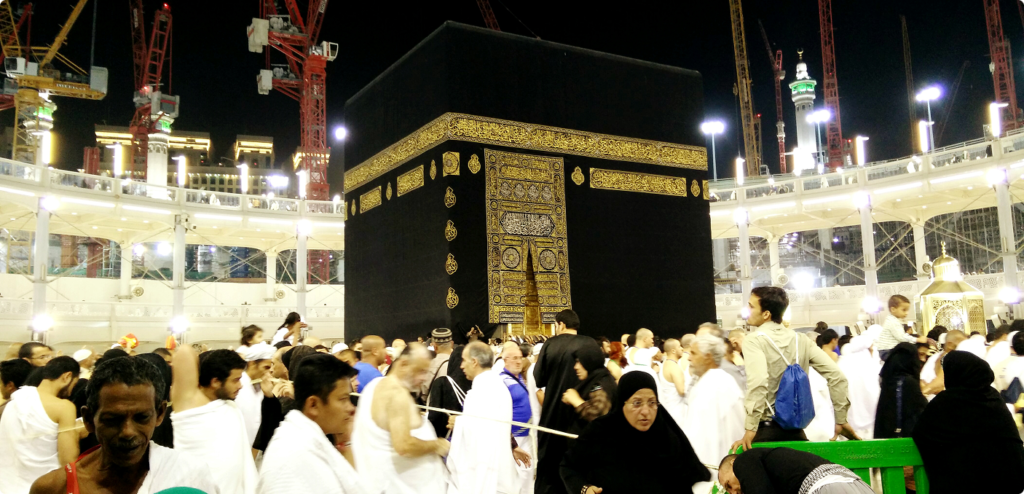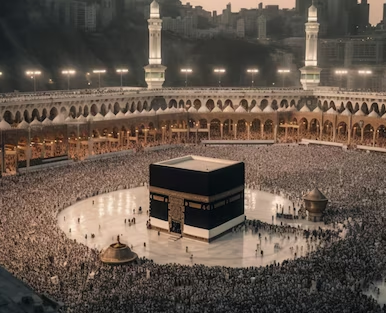In the heart of every Muslim lies a yearning for connection, purification, and closeness to Allah (SWT). The sacred pilgrimages of Umrah and Hajj represent the pinnacle of this spiritual journey, drawing millions to the blessed cities of Makkah and Madinah each year. But what is the profound significance behind these powerful acts of worship? Join us as we explore the spiritual heartbeat of Umrah and Hajj.

Historical Roots: Echoes of Ibrahim (AS) and Muhammad (PBUH). The rituals of Hajj and Umrah are deeply intertwined with the story of Prophet Ibrahim (AS), his wife Hajar (RA), and their son Prophet Ismail (AS). When we perform Tawaf around the Kaaba, the House of Allah built by Ibrahim (AS) and Ismail (AS), we connect with centuries of monotheistic worship. When we perform Sa’i between the hills of Safa and Marwah, we commemorate Hajar’s desperate search for water, a testament to her faith and Allah’s miraculous provision (the well of Zamzam).
Prophet Muhammad (PBUH) revived and purified these ancient rites, establishing the Hajj as the fifth pillar of Islam and performing Umrah multiple times, setting the example for believers for all time. Performing these pilgrimages allows us to walk in the footsteps of prophets, connecting us physically and spiritually to the very foundations of our faith.

The Essence of Submission and Unity: At its core, both Umrah and Hajj are profound declarations of submission (Islam) to the will of Allah. Donning the simple, unstitched garments of Ihram strips away worldly distinctions of status, wealth, and nationality. Side-by-side, pilgrims stand, walk, and pray as equals before their Creator, embodying the universal brotherhood and sisterhood of Islam. This immense gathering, particularly during Hajj, is a powerful reminder of the Ummah’s unity under the banner of Tawhid – the absolute Oneness of Allah.
A Journey of Forgiveness and Purification: One of the greatest blessings of these pilgrimages is the opportunity for profound forgiveness and spiritual cleansing. The Prophet Muhammad (PBUH) said that an accepted Hajj (Hajj Mabrur) results in the pilgrim returning as free from sin as the day they were born. Similarly, Umrah is an expiation for sins committed between it and the previous Umrah. Standing on the plain of Arafat during Hajj, supplicating with sincerity, is considered a pivotal moment for seeking Allah’s mercy and forgiveness. These journeys offer a chance to reset, repent, and return home with a purified heart and a renewed commitment to faith.
Sacrifice and Remembrance: The act of Qurbani (sacrifice) during Hajj commemorates Prophet Ibrahim’s (AS) ultimate willingness to sacrifice his son Ismail (AS) in obedience to Allah’s command, before being provided with a ram to sacrifice instead. This reminds pilgrims of the importance of sacrificing worldly attachments for the sake of Allah and expressing gratitude for His blessings. Throughout the rituals, the constant remembrance of Allah (Dhikr) through Talbiyah, Takbir, and personal Du’a keeps the heart focused on the divine purpose of the journey.
Conclusion: Umrah and Hajj are not mere physical journeys; they are transformative spiritual experiences designed to draw the servant closer to Allah. They embody submission, unity, sacrifice, and the profound hope for forgiveness and purification. Understanding this deep significance enriches the experience, turning the rituals from physical actions into heartfelt conversations with the Divine. May Allah grant us all the opportunity to experience the spiritual heartbeat of these blessed pilgrimages.

